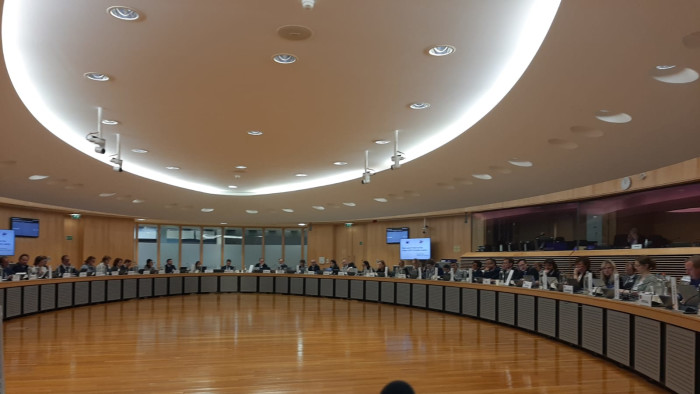
Fair Trials’ Senior Legal Officer, Chryssa Mela, attended the second High-Level Forum on the Future of EU Criminal Justice. This event was organised by the European Commission and the Polish Presidency of the Council of the European Union on 20–21 May 2025 in Brussels. The aim of the Forum is to develop a common vision for actions of legislative and non-legislative character for the next five years.
Participants included the European Commission’s Director General Ana Gallego, Polish Deputy Minister of Justice Dariusz Mazur, 27 Member States, the European Fundamental Rights Agency (FRA), Eurojust, EPPO and various other expert organisations such as the ECBA and CCBE, as well as leading academics. During the Forum, the discussion among participants focused on Judicial Cooperation and the Digitalisation of Justice & AI in criminal justice.
Fair Trials focused on the overuse of the European Arrest Warrant (EAW) compared to other mutual recognition instruments such as the European Supervision Order and the Framework Decision for Transfer of Prisoners. We underlined that EAW legislation does not make it compulsory for judicial authorities to conduct a proportionality assessment and, as part of that, consider whether alternative, less restrictive measures would meet the needs of the investigating authorities.
We emphasised the complexity of the mutual recognition instruments reported to us by practitioners and supported the adoption of a clear proportionality test for the purposes of issuing an EAW. The use of alternatives cannot remain an “option” for authorities, and detention cannot be a measure of first resort. We also called for the adoption of a refusal ground based on the lack of proportionality and necessity of the EAW by the executing country.
We called for monitoring the use of the EAW and other mutual recognition tools through detailed data collection, with a legal obligation for EU Member States to regularly report this data to the European Commission. We also supported more institutional cooperation and recommended longer-term work aimed at bringing together, in a coherent and accessible form, all relevant legislation which is currently scattered.
Fair Trials emphasised the problem of trials in absentia, which should be addressed by expanding the use of videoconferencing while maintaining robust safeguards and exceptions where necessary.
On digitalisation and AI: digital or not, fair trial principles apply. AI and digitalisation, although they are in fact two entirely different topics, have something in common: we cannot hope for malfunctioning processes—where fundamental rights are potentially threatened—to be fixed simply by going digital or utilising AI. We welcomed initiatives that we believe will advance defence rights and the mission of lawyers, taking into account the on-the-ground reality: AI is already being used unofficially by lawyers and justice stakeholders, and this is a reality we should be responding to. Overall, we advocated for efficiency not to come at the expense of fundamental rights.


